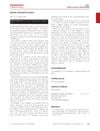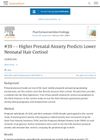 1 citations,
May 2016 in “Current Opinion in Pediatrics”
1 citations,
May 2016 in “Current Opinion in Pediatrics” Children's hair loss can be caused by various factors and should be treated with appropriate, age-specific methods and psychological support.
 1 citations,
April 2016 in “British Journal of Dermatology”
1 citations,
April 2016 in “British Journal of Dermatology” Buschke-Ollendorff syndrome is a rare genetic disorder causing skin and bone changes, with some cases also showing ADHD or developmental delays.
 1 citations,
December 2014 in “Klinik Psikofarmakoloji Bülteni-Bulletin of Clinical Psychopharmacology”
1 citations,
December 2014 in “Klinik Psikofarmakoloji Bülteni-Bulletin of Clinical Psychopharmacology” Adding aripiprazole to the treatment improved hair-pulling symptoms in a teenager.
November 2024 in “Actas Dermo-Sifiliográficas” N-acetylcysteine and memantine are recommended as safe and effective treatments for trichotillomania.
 February 2024 in “Psychoneuroendocrinology”
February 2024 in “Psychoneuroendocrinology” Higher prenatal anxiety is linked to lower cortisol levels in newborns' hair.
 December 2023 in “Current psychosomatic research”
December 2023 in “Current psychosomatic research” Psychological interventions can improve the quality of life for women with PCOS.
 May 2022 in “European medical journal”
May 2022 in “European medical journal” An 11-year-old girl with a hair-pulling disorder had a hairball in her stomach and was treated with medication, therapy, and a team of doctors.
 May 2022 in “European medical journal”
May 2022 in “European medical journal” An 11-year-old girl with Trichotillomania developed a large hairball in her stomach, treated with medication, therapy, and family education.
 May 2017 in “InTech eBooks”
May 2017 in “InTech eBooks” Hair pulling disorder is treated with therapy and medication; hair loss from tension can be reversed if caught early.
 January 2017 in “International journal of science and research”
January 2017 in “International journal of science and research” Trichotillomania is a chronic hair-pulling disorder, more common in females, treated with therapy and sometimes medication.
 April 2016 in “Journal of The American Academy of Dermatology”
April 2016 in “Journal of The American Academy of Dermatology” Different treatments are effective for hair loss conditions, but results vary by individual factors.
May 2015 in “UC Merced Undergraduate Research Journal” Behavioral therapies are more effective than drugs for treating trichotillomania.
January 2015 in “The Encyclopedia of Clinical Psychology” Habit reversal training effectively treats hair-pulling disorder in both adults and children.
 November 2012 in “Hair transplant forum international”
November 2012 in “Hair transplant forum international” Hair loss patients may often have Body Dysmorphic Disorder, and proper psychological assessment and treatment can help.
18 citations,
June 2017 in “Journal of the neurological sciences” Using 5 alpha reductase inhibitors may increase dementia risk in the first two years.
 April 2022 in “International Journal of Health Sciences (IJHS)”
April 2022 in “International Journal of Health Sciences (IJHS)” A holistic treatment approach, including yoga, diet, exercise, and mindfulness, can effectively manage PCOS symptoms.
 August 2023 in “The journal of investigative dermatology/Journal of investigative dermatology”
August 2023 in “The journal of investigative dermatology/Journal of investigative dermatology” Childhood atopic dermatitis does not significantly affect general cognition.
65 citations,
September 2014 in “Orphanet Journal of Rare Diseases” Different STUB1 gene mutations cause varied symptoms in autosomal recessive ataxias.
9 citations,
February 2018 in “Journal of Patient-Reported Outcomes” New tools were created to help lupus patients report their symptoms and impacts more accurately.
1 citations,
September 2023 in “Frontiers in Genetics” A heterozygous mutation in HTRA1 can cause severe CARASIL symptoms.
 September 2016 in “Springer eBooks”
September 2016 in “Springer eBooks” Looking older on the outside might be linked to aging faster on the inside and can be affected by lifestyle choices and health risks.
84 citations,
October 2005 in “Annals of Clinical Psychiatry” Hairpulling, skin picking, and nail biting cause significant harm and need more research for better treatments.
 54 citations,
September 1972 in “British journal of nutrition”
54 citations,
September 1972 in “British journal of nutrition” Malnutrition severely harms growth and development in young baboons.
19 citations,
April 2011 in “Headache The Journal of Head and Face Pain” Both topiramate and divalproex sodium effectively reduce migraine frequency and are generally well-tolerated.
15 citations,
April 2008 in “Headache” People with migraines often have mental health conditions, and treatment should be personalized to address both issues safely.
 11 citations,
March 2021 in “Dermatology and therapy”
11 citations,
March 2021 in “Dermatology and therapy” Researchers created a new tool to measure the effects of alopecia areata from the patient's view, focusing on hair loss, daily life, and emotional health.
 8 citations,
December 2021 in “BMJ neurology open”
8 citations,
December 2021 in “BMJ neurology open” Sodium selenate was found to be safe and possibly slows Alzheimer's progression, but more research is needed.
5 citations,
February 2019 in “Neuroscience letters” Hormones during puberty increase certain receptors in the brain, and this change is influenced by estrogen levels.
5 citations,
May 2018 in “European journal of pharmacology” Fesoterodine is effective and safe for elderly patients with overactive bladder.
 5 citations,
May 2018 in “Drug Safety”
5 citations,
May 2018 in “Drug Safety” Using electronic health records can help identify drug side effects but has some limitations.


















